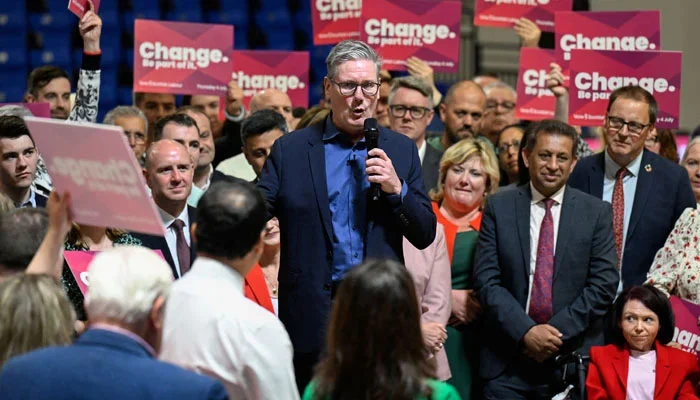London: Britain’s political leaders frantically pushed for a vote late on Wednesday in the final hours of an election campaign expected to return a Labor government after 14 years of Conservative rule.
In his final address to supporters, Prime Minister Rishi Sunak insisted the contest was “not over”, admitting he was an “underdog”. It comes hours after the latest flurry of polls showed his ruling Conservatives on course for a record defeat by Labour.
They suffered another blow at the 11th hour when the tabloid The Sun – known for backing election winners – endorsed Labour’s Keir Starmer.

Polls show his centre-left party is set for its first general election win since 2005 – making Starmer the party’s first prime minister since Gordon Brown in 2010.
For the UK, it would represent a shift to the left after almost a decade and a half of right-wing Tory governments dominated first by austerity, then Brexit and now the cost of living crisis.
Starmer, 61, has been criss-crossing the country trying to drum up support and warning against overconfidence in the remaining hours of the campaign.
“What I said to the team is that nobody can be complacent,” he told reporters aboard the same plane that took the England soccer team to Germany for the European Championships.
Starmer joked that he hoped it wouldn’t bring them home anytime soon and said Labor had been doing “a lot of preparation” to govern.
“We won’t get any time for mercy. We’ll start now.”
Sunak, 44, sought to hammer home his oft-repeated warnings that a Labor government would mean higher taxes and a weakening of national security – taunts Labor described as “desperate”.
The Tories have also stepped up their warnings about the dangers of winning a “super majority”, which their rival fears is set to hit turnout.
Senior minister and Sunaka ally Mel Stride said on Wednesday voters would “regret” handing Labor “continuous” power without an effective Tory opposition.
Ex-prime minister Boris Johnson – ousted in 2022 by his own colleagues, including Sunak – staged his first major campaign hit on Tuesday, urging people not to see the result as a “foregone”.
Sunak repeated the message at the latest event 24 hours later in Hampshire, southern England.
“It’s not over until the final whistle, my friends, and I can also tell you that this underdog is going to fight until the final whistle,” he told fans.
Labor has enjoyed a consistent double-digit lead in opinion polls over the past two years, with many voters unhappy with the Conservatives’ handling of a range of issues, including public services, immigration and the economy.
Several polls predict Labor will win more than the record 418 seats it secured when former leader Tony Blair ended 18 years of Conservative rule in 1997.
Labor needs at least 326 seats to secure a majority in the 650-seat parliament.
Voters head to the polls from 7:00 a.m. (06:00 GMT) on Thursday, with results expected from around 2230 GMT until Friday morning.
This is Britain’s first July election since 1945, when Labor led by Clement Attlee defeated World War II Conservative leader Winston Churchill, ushering in a period of transformative social change.
Attlee’s government created a modern welfare state, including the state’s National Health Service (NHS), which is the second most respected in Britain after the royal family.
Starmer’s “change” agenda is less radical this time around, promising careful management of the economy as part of a long-term growth plan that includes nursing battered public services back to health.
A Labor government would face a formidable list of tasks, from accelerating anemic growth to ending NHS strikes and improving relations with Europe after Brexit.
Some voters simply see a respite from politics after a chaotic period of five prime ministers, a series of scandals and a Tory battle between centrist and right that shows no sign of abating.
The Sun, which supports Labour, called the Tories “a divided bunch more interested in fighting each other than running the country”, adding: “It’s time for a change.”
Starmer – the son of an instrument maker and a working-class nurse – lacks the political charisma or popularity of Blair, who presided over Labour’s last victory in 2005.
But the former human rights lawyer and chief prosecutor is benefiting from a country fed up with the Tories and a sense of national decline.
Arch-Eurosceptic Nigel Farage hopes discontent will be elected MP at the eighth attempt, while the Lib Dems are expected to win dozens of seats.











